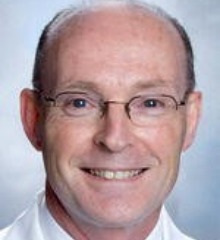What are we to make of the fact Alberta’s preferential health care access inquiry has failed to call a witness who was at the centre of one of the most spectacular allegations of medical queue jumping in recent years?
Really, yesterday’s report by the Canadian Broadcasting Corp. that the often strangely passive inquiry has decided not to bother asking Dr. Ciaran McNamee to testify about what happened to his lung surgery patients simply boggles the mind.
McNamee told the CBC he is “willing to co-operate, in any form or fashion.”
But the inquiry’s lead council, Michele Hollins, told the national network that McNamee — who today works as a lung surgeon in Boston, where he also teaches at Harvard University — “is not being called to testify because it was decided his information was ‘dated’ and would provide little useful information about queue-jumping that may be occurring now.” (Emphasis added.)
Just wondering, but isn’t the point of holding an inquiry to look into what happened in the past, with the idea of preventing it from happening again in the future?
Back in the spring of 2011, the CBC revealed that McNamee, once the head of thoracic surgery at the University of Alberta Hospital, had sued the former Capital Health Region, claiming he’d been improperly hounded out of his surgical practice for complaining publicly about his patients’ long waits for surgery in the late 1990s. He also claimed CHR officials had improperly questioned his competence and even his sanity.
This was one of the incidents that led to calls for a judicial inquiry into bullying and intimidation of medical professionals in the Alberta health care system.
McNamee’s allegations became public at about the same time as Dr. Raj Sherman, now the leader of the Alberta Liberals, claimed in the Legislature that 250 people had died, many from lung cancer, while on a 1,200-name surgical waiting list in the 1990s.
In 2008, the CHR had been rolled into Alberta Health Services, the massive province-wide health authority that is only one baby step away from being an actual branch of the government.
“CBC News has learned that in the course of McNamee’s lawsuit, there was an allegation that his budget for lung surgery had been all, or in part, effectively taken over by other surgeons at the hospital,” the network reported, cautiously adding, “that allegation also was not proven.”
Unfortunately for those who would like to cast a light on what was going on in Alberta’s health care system back in the 1990s, the lawsuit was settled out of court in 2001 and McNamee was bound by a convenient non-disclosure agreement — unless he is subpoenaed to testify.
So what about it? “If the commission wishes to subpoena me, I will co-operate, and I will respect their mandate,” McNamee told the CBC’s interviewer. But the inquiry led by retired Justice John Z. Vertes, apparently, just isn’t all that interested.
In a blog post on the Alberta Liberals’ website, meanwhile, former party leader Dr. David Swann, who like Sherman is a physician, accused the inquiry of “deliberate avoidance of the most dramatic allegations of queue jumping.”
Swann can get away with a strongly worded statement like that without risk of being held in contempt, by the way, because the inquiry is not a real judicial inquiry with independent powers, but comes under the authority of the provincial government and reports to Health Minister Fred Horne. Likewise, Vertes, who has retired, no longer has the full powers of a judge.
Whether or not this has any effect on the actual independence of the inquiry, as suggested by Swann, is another matter entirely. But it certainly affects the public’s perception of the inquiry’s independence — and circumstances like the apparent willingness of McNamee to testify and the peculiar lack of interest by the inquiry to hear him, add to it.
“Many of his lung patients were ‘bumped,’ allegedly by other surgeons given preferential access, resulting, allegedly, in preventable deaths among his patients,” Swann wrote.
Meanwhile, as is well known, the inquiry has stumbled across some evidence of queue jumping in the here and now — the case of the mysterious ability of healthy patients of the $10,000-per-year Helios Wellness Clinic in Calgary to receive cancer screens in mere weeks that took all others years to get.
In testimony yesterday, a letter from senior AHS gastroenterologist Dr. Mark Swain entered as evidence said the health agency found “clear evidence” that one of the Helios doctors’ patients were the beneficiaries of preferential access to the tests.
In testimony reported by the Calgary Herald, Swain (referred to by the Herald as Dr. Mark Twain, in case you’re wondering, an easy mistake to make) told the inquiry Dr. Ron Bridges was assigned more endoscopy time than was normal for physicians who used the public cancer-screening clinic and benefitted from a “highly unusual” booking process. Swain’s explanation: “He’s not seeing sick patients.”
For his part, Bridges testified that he had no idea his patients were getting preferential access. Earlier, Bridges’ lawyer had tried unsuccessfully to prevent the report referring to patients being entered as evidence.
Well, this is all very interesting, if not exactly a shocker given last week’s testimony about the relationship between Helios and the public colon cancer-screening clinic located in the same Calgary building.
But if this inquiry is really supposed to get to the bottom of queue jumping in the health care system, it’s pretty clear McNamee needs to be called and asked about what happened back in the 1990s — even if that means discomfort for powerful people with connections to the Progressive Conservative government.
This post also appears on David Climenhaga’s blog, Alberta Diary.




